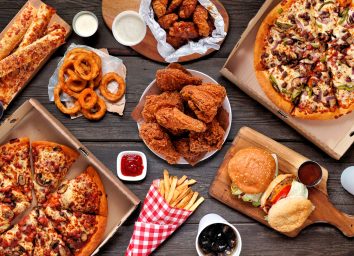
There may have been a time when you ate whatever you wanted without few, if any, health consequences. You might remember that time well! But it's true—nothing lasts forever.
"After 50, metabolism slows, estrogen levels drop, and certain nutrient requirements rise," says Hillary M. Wright, MEd, RDN, LDN, co-author of The Menopause Diet Plan, A Natural Guide to Hormones, Health, and Happiness. "At this point, you'll probably need to make wiser food choices to help head off midlife weight gain and prevent conditions that are more common with age and menopause."
Though no food is ever completely off the menu, the trick is to get the biggest bang for your caloric buck while enjoying yourself. Here's what to choose, and avoid, most of the time, for women over the age of 50. And for more, check out The 7 Healthiest Foods to Eat Right Now.
First up, here are the best foods to eat.
Salmon

Calorie needs decline with age, but weight gain isn't inevitable. Salmon is a stellar source of protein, which requires more calories to digest than carbohydrates and fat and could help prevent the dreaded belly fat that is common in midlife women. The omega‑3 fats in salmon are good for your heart and brain because they reduce the risk for clogged arteries, decrease elevated triglycerides (fat) in the blood, and lower blood pressure, all of which tend to increase in women in their 50s.
Fish such as salmon may also boost your mood. Eating more fish is associated with a decreased risk of depression, which is more common in women at midlife. Salmon also harbors vitamin D, a nutrient that is key in helping to prevent osteoporosis. Three ounces of cooked sockeye salmon nutrients has nearly all the vitamin D you need for the day after age 50.
Nuts
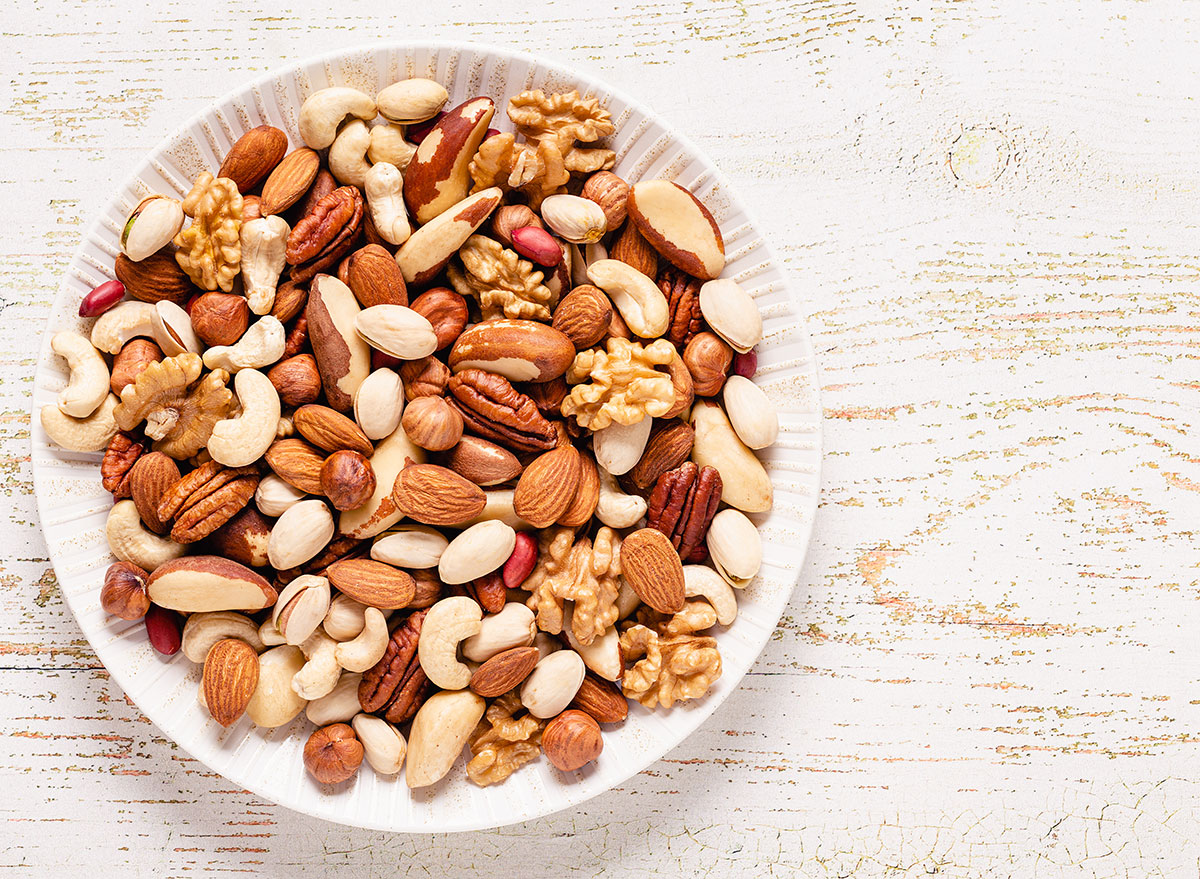
"For their small size, nuts contain relatively high levels of calories and fat, so you may think that avoiding them will help whittle your waistline, but the opposite is more likely to be true," Wright says.
Research has found that eating nuts actually help regulate appetite which could make weight control easier. Nuts supply plant protein, heart-healthy, unsaturated fat, potassium, fiber, and other nutrients linked to good health as you age. In fact, women who munched on 1 1/2 ounces of pistachios for 12 weeks improved the quality of their diet without affecting their weight.
When you include delicious and nutritious nuts on a regular basis, you're doing your heart and brain a favor. Nuts are rich in arginine, an amino acid necessary for making nitric oxide, which eases blood flow to the heart and the brain by relaxing constricted blood vessels. Get the greatest benefit from nuts by swapping 1/4 cup of unsalted varieties such as peanuts, almonds, walnuts, and pistachios (shell on) for snack chips, pretzels, and sweets.
Berries
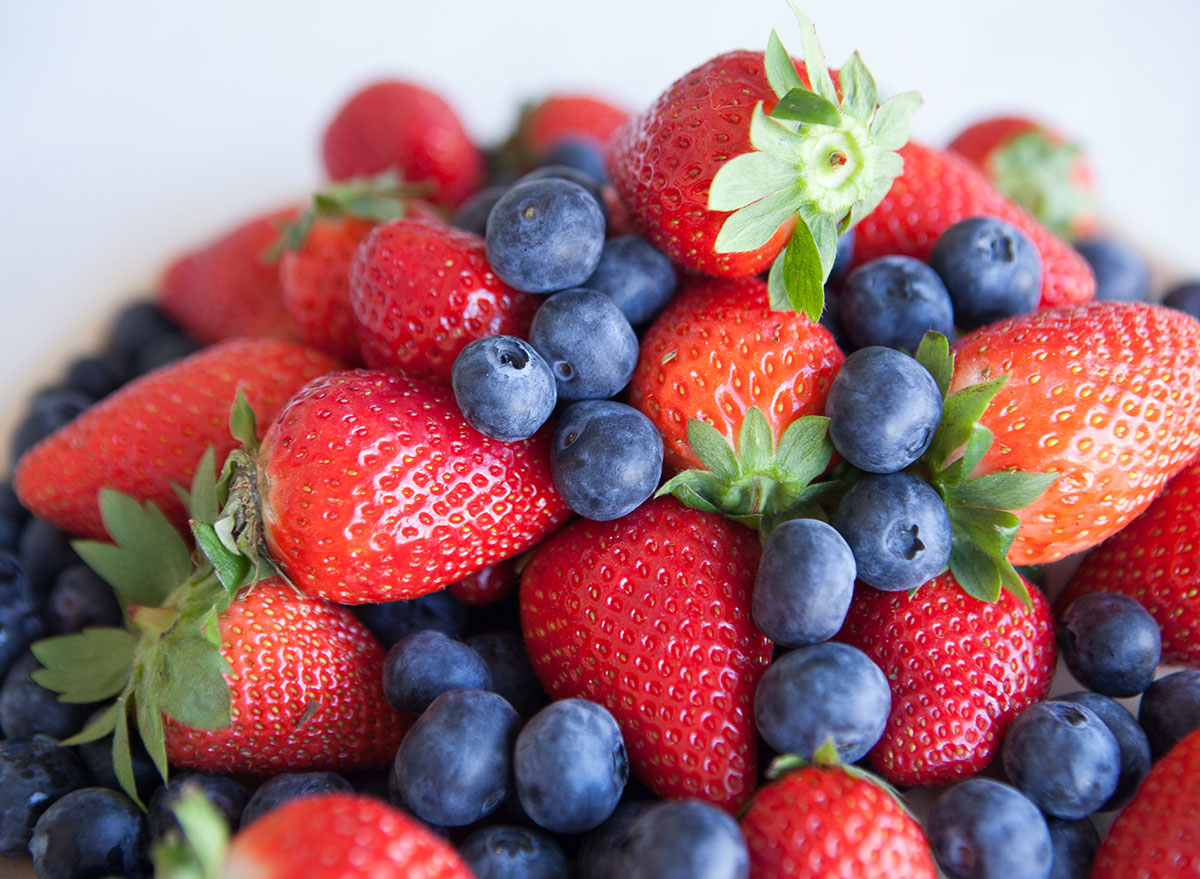
When it comes to banishing brain fog and protecting your memory after 50, it pays to squelch oxidation and inflammation. Berries supply many different types of powerful compounds called phytonutrients that help to head off brain cell damage and improve or increase communication between cells, among other ways of supporting brain function.
Blueberries, strawberries, raspberries, and other brightly-colored orbs are juicy and delicious without any added sugar. So these fruits can easily take the place of highly-processed, calorie-packed sweets that will actually provide you with some fiber to keep you fuller for longer. Blueberries and blackberries are also a source of vitamin K, which is necessary to produce osteocalcin, a protein that supports bone strength. Some research suggests that higher intakes of vitamin K are linked to better bone health in older women.
Looking for more helpful tips? Sign up for our newsletter to get daily recipes and food news in your inbox!
Legumes

Legumes such as black beans, garbanzo beans, and pinto beans contain magnesium to help protect against heart disease, stroke, type 2 diabetes, and osteoporosis. Beans are packed with potassium, which is great news for your ticker, as it's linked to a lower risk for cardiovascular disease. One half-cup of black beans supplies about 400 milligrams of potassium—nearly as much as a medium banana, and about 15% of the recommended daily intake.
Beneficial bacteria in your colon ferment the prebiotic fiber found in beans and produce compounds called short chain fatty acids (SCFA). SCFA help reduce the risk for colon cancer, which increases after age 50, improve the body's absorption of calcium and magnesium to support bone health, and help to head off heart disease and type 2 diabetes. Another type of fiber in beans bulks up bowel movements and prevents constipation, which can be more common with age.
Soy

Declining estrogen levels are likely the reason for hot flashes, which affect about 75% of women living in the U.S. for at least two years in their 40s and 50s. Soy foods contain phytoestrogens, plant-based estrogen that is similar in function to human estrogen, but with much weaker effects in the body.
"Women who eat soy every day, including those who live in Asian countries, report having fewer hot flashes and other menopausal symptoms, but there is no scientific evidence to support the link between tofu, tempeh, and edamame and hot flash frequency and intensity," Wright says.
Still, there are plenty of reasons to include soy foods in a balanced eating plan at any stage of life. Soy is a source of complete protein, and it's a suitable substitute for fatty and processed meats. Plus, soy is also heart-healthy. Eating 25 grams of soy protein daily, about the amount found in 1/2 cup roasted soy nuts and 1 cup unsweetened soy milk, actually reduces LDL ("bad") cholesterol, which helps lower heart disease risk. As an added bonus, tofu that's processed with calcium offers a significant amount bone-building calcium, and tempeh and soybeans pack fiber.
Plain Yogurt

Yogurt is a mixture of milk and live active cultures (LAC), also known as probiotics, which are live organisms that help promote gut health by populating the colon with beneficial bacteria. The Live & Active Cultures seal from the National Yogurt Association denotes yogurt with the most LAC. Yogurt is also packed with protein that burns more calories and keeps you fuller for longer. In addition to possibly protecting against midlife weight gain, regular intake of yogurt with LAC may help promote healthier blood pressure and head off type 2 diabetes.
Yogurt also offers protein and calcium to support bone health. After age 50, suggested calcium intakes increase to 1,200 milligrams a day. A cup of plain regular yogurt supplies about 448 milligrams of calcium. Avoid sugary fruit-flavored yogurt in favor of plain yogurt mixed with berries for more protein, fiber, vitamins, and minerals, and no added sugar.
And now, here are the foods to avoid.
Coffee and Tea Drinks

You know to stay away from sugary soda, flavored fruit beverages, and sports drinks, but you may still be sipping too much added sugar in your favorite coffee shop beverage.
Experts suggest limiting added sugar to 50 grams a day on a 2,000-calorie eating plan and one specialty coffee or tea drink can use up your daily allowance, and more. For example, a medium Frozen Chai Latte from Dunkin' supplies 83 grams of added sugar and 520 calories while a large Smoked Vanilla Cold Brew with Sweet Cold Foam has 48 grams of added sugar and 260 calories.
Consuming sugar-sweetened beverages of any kind on a regular basis may lead to weight gain, which is linked to 13 types of cancer, including cancer of the breast (after menopause occurs), ovarian cancer, and endometrial cancer. According to the American Institute of Cancer Research (AICR), staying at a healthy weight throughout life is the single most important thing you can do to protect yourself from cancer.
Even if you're not overweight, excess added sugar is linked to a greater likelihood of dying from heart disease. Eating patterns rich in added sugars have been linked to insomnia in women after menopause.
Highly-Processed Meats
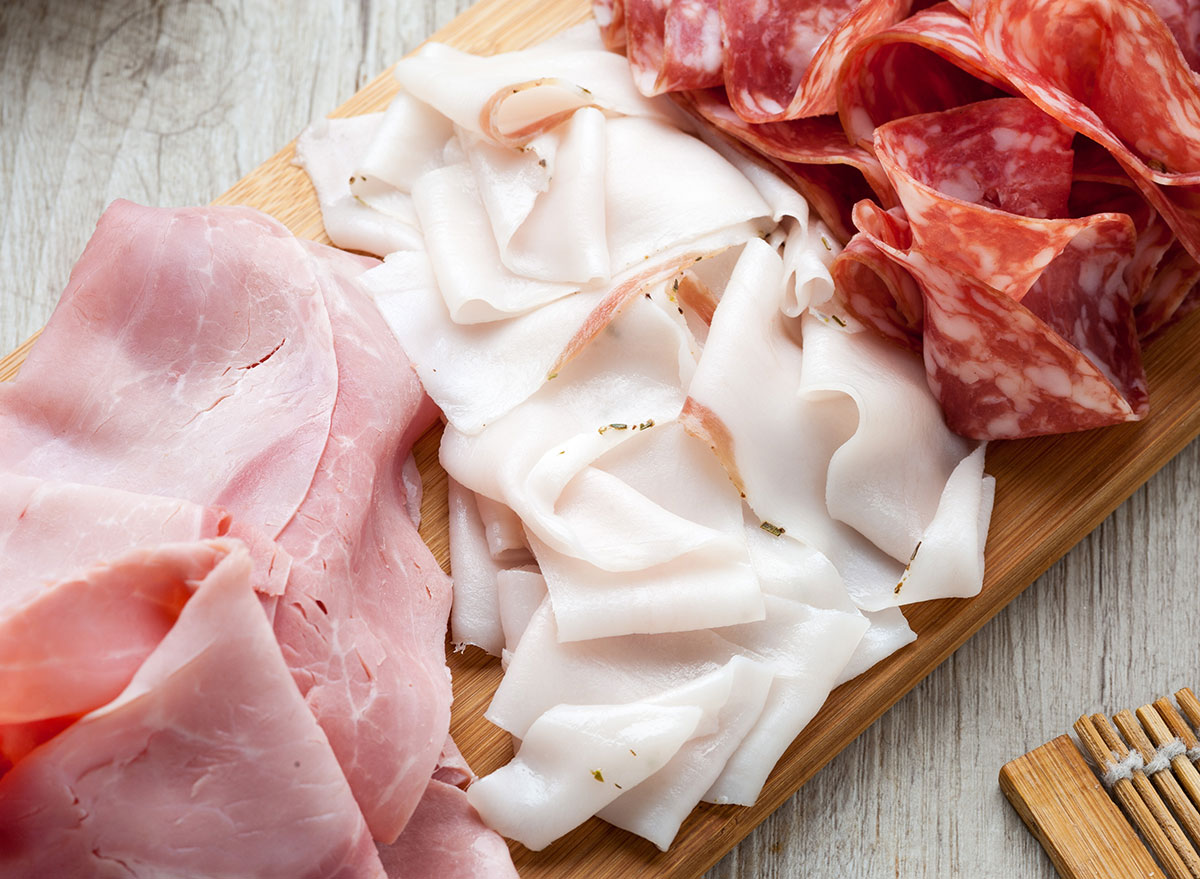
It's a good idea to save that hot dog, breakfast sausage, or deli meat sandwich for a special occasion.
Limiting highly processed meats helps lower your chances of colorectal cancer. The AICR warns against eating meat that's been smoked, cured, salted, fermented, or has preservatives, including hot dogs, sausage, salami, bacon, and deli turkey and ham. The AICR says convincing evidence suggests that the risk for colorectal cancer begins to increase even with low consumption of processed meats, which contain cancer-causing additives called nitrates.
And you can forget about meats cured with celery powder and celery juice or other natural sources because they pose the same health risks as those with nitrates. Most highly-processed meats also pack unhealthy levels of saturated fat and sodium and few vitamins and minerals, which means you get very little in the way of nutrition for the calories.
Veggie Chips
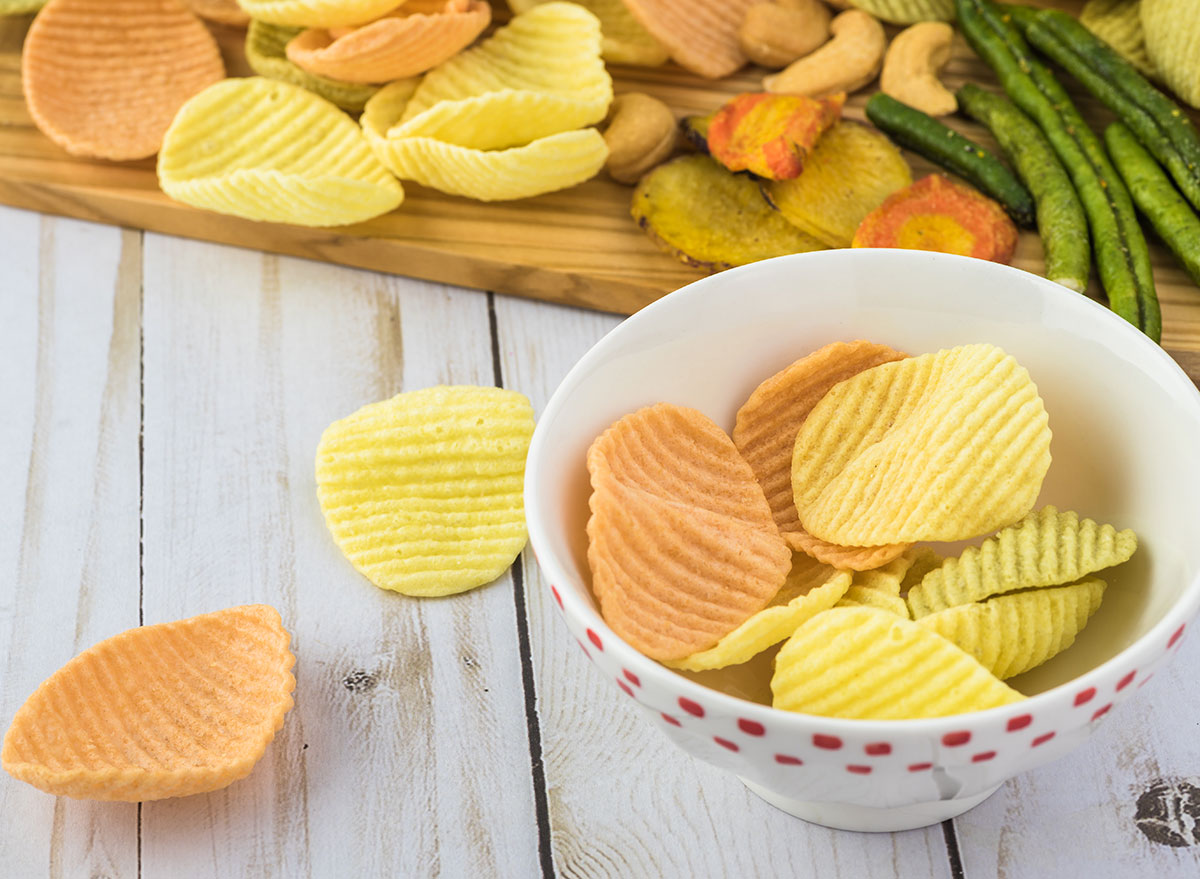
Trying to eat more vegetables? There's good reason: Only 10% of Americans the recommended daily amounts. You won't do yourself much good by chomping on chips made from sweet potato, beets, and parsnips, though.
Veggie chips may seem like a great way to include vegetables, and the perfect alternative to potato chips, but their health halo is undeserved. All kinds of veggie chips, including potato, may be crunchy and delicious, but they are highly processed foods with far less fiber, vitamins, minerals, and protective phytonutrients than a baked or roasted white or sweet potato or beets, and they contribute calories to your diet while offering very little nutrition.
After age 50, calorie needs tend to drop, and mindlessly munching a couple of ounces of veggie chips can easily tack on about 300 calories to your daily totals. Baked veggie chips are somewhat better nutritionally than fried, but neither kind can replace eating vegetables in their more natural state.
Alcohol

As a woman in her 50s, you may be juggling work and family, and possibly caring for one or more elderly parents, and, after a hard day, you enjoy unwinding with a glass of wine or a cocktail. While alcohol can be part of a healthy lifestyle after 50, you should know your limits for alcohol.
Experts suggest that women limit alcohol to one drink a day, if that.
Why so little?
Because having even less than one drink every day is associated with increased breast cancer risk. We tend to underestimate the size of a drink and get more alcohol in the bargain. A standard drink is 5 ounces of wine, 12 ounces of regular beer, or 1.5 ounces of 80-proof alcohol.
Alcohol may relax you at first, but it interferes with sleep, and it can aggravate hot flashes, never mind what it can do to your waistline.
"Wine, beer, and hard liquor contribute excess calories that can make weight control more difficult," Wright warns. "To make matters worse, it's easier to ignore your commitment to healthier eating after a drink or two."

